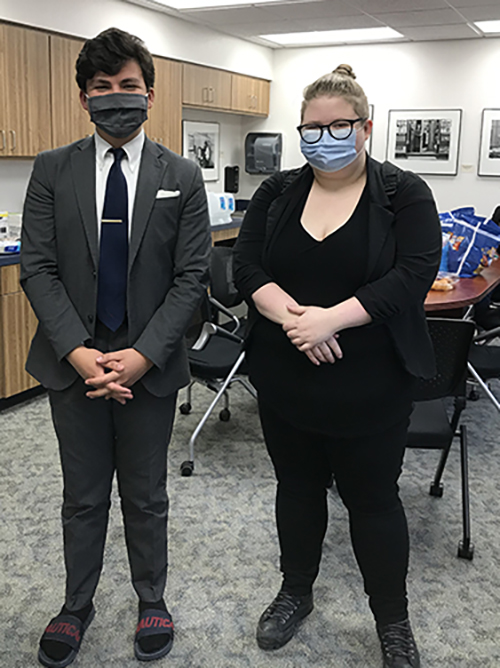MSU Texas Model UN team earns top award at national conference
For the second time in program history, the MSU Texas Model United Nations team earned the highest recognition at the national collegiate Model United Nations Conference, an Outstanding Delegation award, and three individual awards. The MSU Model United Nations Team competed at Model UN, an event that draws teams from across the globe, March 28-31.
This year’s conference was unique in that, for the first time, it was held virtually, creating a several unusual challenges. This, combined with the fact that the 2020 competition was canceled due to COVID-19, made this accomplishment even more meaningful to the students.
Steve Garrison, Associate Professor of Political Science and Model UN adviser, called this an “amazing accomplishment” for the students. “Considering that over half of the attendees are typically from outside the US and from much larger schools than MSU, this accomplishment indicates that MSU Texas students are leaders among their peers at the international level,” he said.
Also for the competition, students create position papers, one or two-page documents representing the United States’ position on key policy questions. MSU Texas students received two Outstanding Position Paper awards. Shelbi Stogdill (political science major and Student Government Association president) won for her work in the Security Council addressing the crisis in Yemen. Crege La Ronde (engineering major) and Shelby Ochs (theater major) were recognized for their work in the UN Environmental Assembly on controlling vector-borne diseases.
“The student commitment to Model UN is amazing as the proceedings begin with breakfast and extend throughout the day,” Garrison said. “To be successful our team must be present and actively involved in the proceedings. Achieving an Outstanding Delegation Award indicates that in each committee, MSU Texas team members were not only actively involved in the proceedings at each step of the process, but also leading them. This recognition is a significant accomplishment given the level of competition.”
Model UN is a learning simulation in which students role-play the delegation of a country in the United Nations. This year MSU Texas represented the Commonwealth of the Bahamas. Students serve on various committees organized by policy area, and they are charged with developing solutions to existing global problems such as disposal of nuclear waste, control of vector-borne diseases, or financing development in the developing world.
Garrison said that Model UN epitomizes the core mission of a liberal arts curriculum in that it is a multi-disciplinary activity requiring students to conduct independent research, critically examine a real-world problem, develop a solution to this problem, and then convince their competitors that their solution is the most effective. “This high-impact learning practice requires students to utilize research, critical thinking, communication, and, most importantly, leadership skills. To be successful students must speak publicly on their solution, as well as build coalitions of supporters to have it adopted,” he said.
Because the event was held virtually, the team was required to master virtual negotiations and presentations. The team was comprised of students from five of MSU Texas’ six colleges and this multi-disciplinary makeup was instrumental in the team’s success. Student preparations began in the fall semester and included numerous hours of independent, extensive research and writing. “This commitment was especially impressive this year, as the team was unable to meet physically until the week before the conference began,” Garrison said.
2021 Team Members and their majors are: Celestine Anna, political science; Emily Beaman, political science; Zetta Cannedy, political science; Shelby Davis, economics; Autumn Fredline, English; Abby Jones, mass communication; Crege La Ronde, engineering; Cheslin Maloney, chemistry; Shelby Ochs, theater; Andres Revis, political science; Braelyn Ringwald, special education; Shelbi Stogdill, political science; and Sallisa Wyatt, finance.

